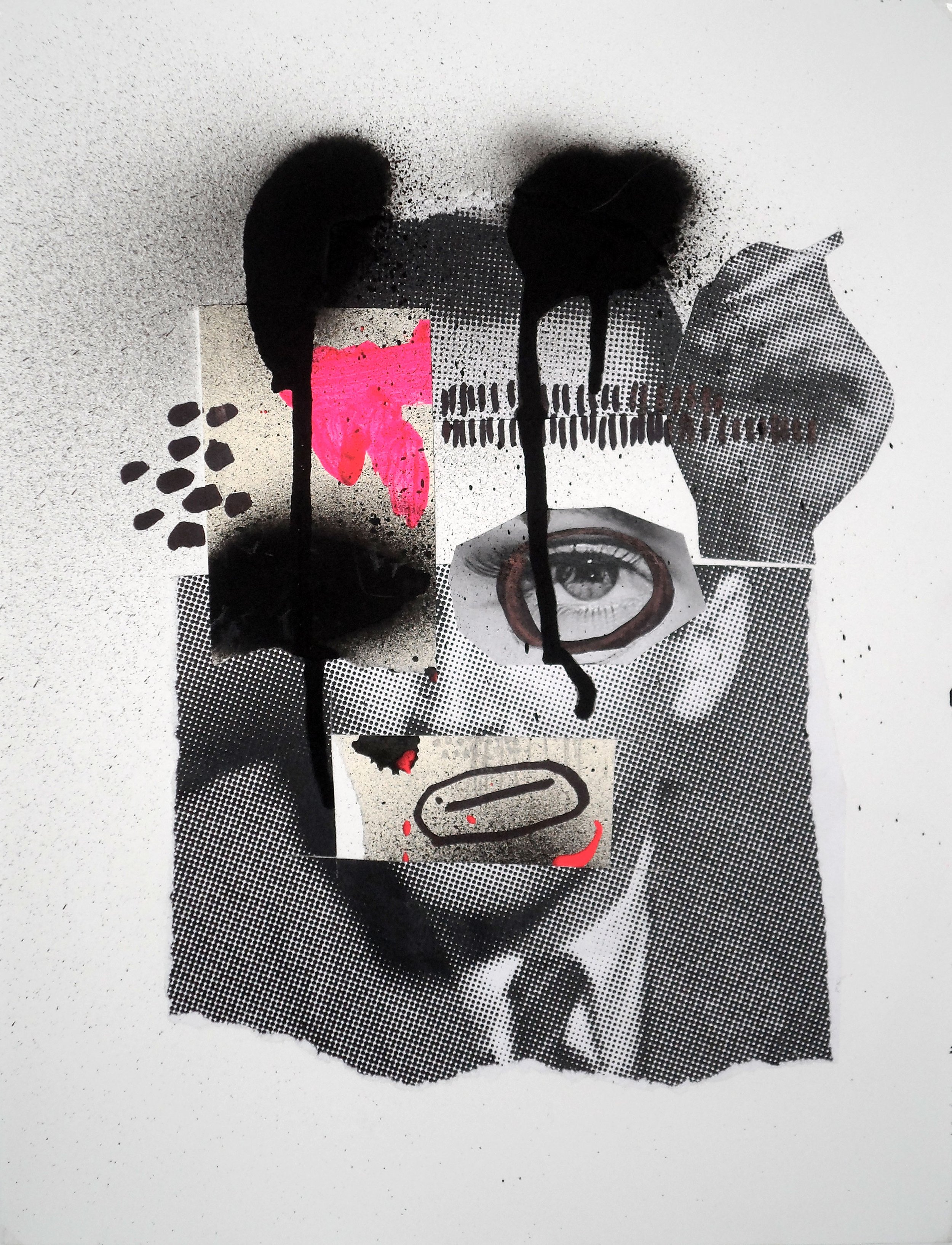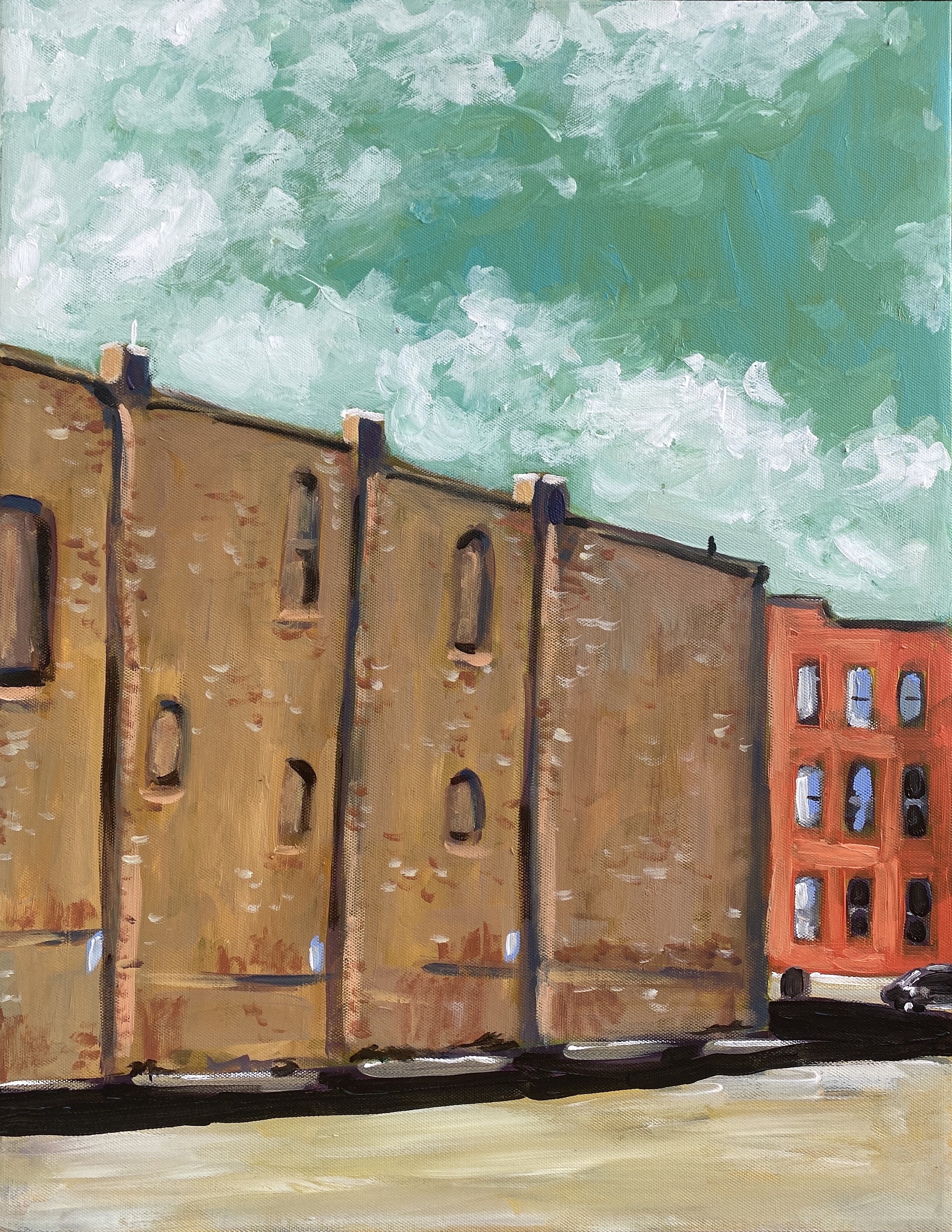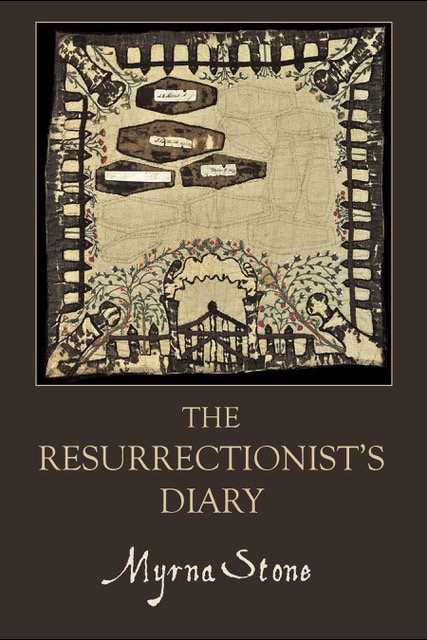WINTER 2021 | Dayton, OH
Oregon District at Night by Sarah Sutphin
The Light
Terry Focht
The sound of water
gushing, pulsating
as it journeyed through the forest
crashing against wooded obstacles,
yet in perfect rhythm
chanting its cadence.
The 3D images were darker
than I wanted them to be.
My mind eventually joined my eyes
drawn to a distant light
alone…near the center.
There were medical specialists
quietly talking,
cautious,
with careful words.
I realized that very moment
I was looking inside of her.
Inside a human being,
inside her heart where I have lived
for almost 60 years.
I had rushed her to the ER
just hours before.
Her pain was great.
Her breath was weak.
Her heart had failed.
The echocardiogram was alive
with the noise of the forest.
We concentrated on the light.
Deep Sorrow
Terry Focht
Inspired by Terrill Martinez poem, “Grief”
Grief is a sneaky son of a bitch,
lurking around the corner,
waiting to punch you in the gut,
or hit you below the knee,
tumbling you to the floor,
gasping for air,
while a warped version
of a familiar song plays…
at 10:17 on a nondescript,
cloudless day.
Toppa Joppa
Andrew Gilkey
The milky way flexes one of its
many arms over Toppa Joppa.
A ghostly smudge, God’s sweaty
palm print speckled with His remains.
The lonely points of light are brass buttons
on dress blues.
We never know what the wood we chop is for,
firewood, casket material or a new wheelchair ramp.
The woods are immensely quiet.
A vast, unfillable, all-swallowing stillness.
Even our tin-pot logging camp
and misremembered Drake remixes
or even the chainsaw cannot cleave
the wordless watching of the wood hull.
Orange clouds slip sand into my shoes.
The earth’s clay-toned cough covers all
the double-wides, the wild flowers.
All sprouting from the students
unchained from their workbooks
and the burden of teenage volunteers
descending upon the baseball diamond.
Dewey’s Park Tornado
Andrew Gilkey
The trees are a mass of mangled
elephant bones.
Jagged fracture points
stretching to heaven.
The wounds are visible,
naked branches hang above
a dying debris bed.
The pink stuffing swells
like a scab on the siding.
“Did you even know it was happening, Dad?”
“Well, no, not until it came up on
the television,
so I watched the football game in the basement.”
When that gray metallic wind blew
the sex shops and car dealerships
and even the rubber shark
that hung outside of Sharkey’s Gentlemen’s’ Club
floated away like dandelion seeds.
A shirtless man is pushing a shopping cart
of scrap up the side of the highway.
And the Wonder Bread™ truck rolls on past him.
Past the overgrown lots
where they pulled the apartments up
by the roots.
Pine Grosbeak
Betsy Hughes
The body of this finch is mostly gray,
but head and chest convey that he is male:
he's decked in handsome orange-pink-rosé,
a reddish tinge that's subtle but not pale.
His bill, both sharp and stubby, shells the seeds,
nips off the tree buds and the little fruits
he forages in forests. Then he feeds
upon his finds according to his suits.
He's not flamboyant, but his curvature
is comely, and his wings' defining lines
make pleasing patterns in the forests' fir
and other conifers of spruce and pines.
This grosbeak loves his perfect perch, a place
in winter's peaceful, evergreening grace.
The Wife of Bath Is Alive and Living on Bole Street
Jane K. Kretschmann
My, my! Do come in, dear. You’re here
about the grandfather clock, right?
It’s in the back hallway. Why don’t you
sit here in the kitchen first and have
a cup of coffee with me. And coffee cake.
You look like a man who likes his cake.
Excuse the robe. There’s just not much need
for a widow woman like me to get up
and dressed early anymore. Oh, the clock.
It’s a Tempus Fugit, like I said in the ad.
That’s all I know. It belonged to my husband
when we got married. My third. Yes, it just
goes to show you don’t have to be young
and a looker to catch a man, if you’re good—
well, you know what I mean. But you, now
you’re a looker. Surprised your wife lets you
out without your wedding ring. Oh, now, now.
Not married. So. Yes, the clock works just fine.
Heavy, though. German, I think. You might need
help moving it. Or not. You look nice and strong.
Have kept fit, I see. Or maybe it’s your work.
In sales? Ah, you will sweet talk me into lowering
my price. I’m sure we can work something out.
I don’t really need the money. The house is paid for.
You want to see it now. Just listen. It’s striking noon.
Such a masculine chime. I always love a strong
bong. Yes, think about it. Maybe you’d like to come
back tomorrow night and see it then, after supper.
Safe in Alabama, 1965
Jane K. Kretschmann
My aunt in Virginia called to ask whether it was safe
for her family to drive down. Mama scoffed, “Jane
drives to Troy to college every day. John to work.
There haven’t been any marches from Helicon, no
roads blocked. Don’t believe all that stuff you see
on television. Outside agitators. Of course, it’s safe here.”
Maybe Aunt Ruby should have asked, “Safe for whom?”
Certainly not safe for Viola Liuzzo, shot in her car,
ferrying marchers between Selma and Montgomery.
Not safe for Reverend James Reeb, attacked
while walking down a street in Selma,
dying two days later.
Not safe for Jimmie Lee Jackson, beaten and shot
by state troopers in Marion as he tried to protect
his mother and grandfather.
Or safe for Willie Brewster, murdered
by white supremacists, on his way home
from work in Anniston.
Or seminarian Jonathan Myrich Daniels,
killed in Hayneville, shielding another activist
from shotgun blasts.
And I, who safely drove to college every day,
was not safe from the racism and bigotry
that is taking all my life to try to overcome.
Trajectory
Anne Randolph
Yesterday a neighbor who has been ill
stopped to chat in front of my meadow.
After he recommended I plant blue baptisia
and bee balm, I asked him how he was faring.
He depicted with a downward tilting
hand the slope he said we are all on,
like a gentle bike path where one doesn't
have to pedal. Then he slanted his hand
into a steeper slide, where the runaway
ball of his life rolled, no one able
to slow it.
My face sagged as I slumped.
He proclaimed the refrain: One day
at a time. When his wife joined
us, he began to joke, Don't blame
me if your plants don't do well!
And they sauntered on, down our sloping street.
Women's Park, Yellow Springs, Ohio
Anne Randolph
The serpentine red brick path unfurls
before me, an invitation, surrounded
on either side by blue baptisia, purple
coneflowers and orange butterfly weed.
Ahead, a hint of sparkling blue trickles
down a rise, catching my eye. The path
becomes a boardwalk through curving,
shiny blue puddles reflecting sun and sky.
Butterflies and bees swoop by.
As I draw nearer, the wet undulating
forms become small round tribute tiles
packed together like a crowd of faces,
honoring our community's women.
Descriptive phrases are etched
on each named clay piece:
music in friendship,
work your passions,
poet, gardener, soulmate.
I warm at the sight.
Their lights burn brightly here,
a gathering of stars forming
a constellation we can orbit
forever.
Her Haven
Rita Coleman
Homage to Glen Helen Nature Preserve, Yellow Springs, Ohio
At ten,
legs as long as a colt,
she sprinted to the Blue Hole,
splashed and shrieked
with the rest, surfaced, skinned
her hair back, wiped her eyes free
of cold, magic water, only to plunge
again, the afternoon burnished
gold. When dinner beckoned
her hungry stomach,
she grabbed an old towel
and trooped out of the Glen
with her friends,
towards a hot meal
paid for by food stamps.
At ten,
she did not know
they were money-poor,
did not know the truck
that rear-ended her mom
had brought them to this paradise
where the jewels of the Glen
awaited her each day, where
she could sway
on the old footbridge,
each step a trial
for balance, hands
gripped on the rope
thicker than her forearm,
and swing across the music
of the creek.
She could inhale the forest of pine,
trees with roots as big as elephant
feet, lie on a bed of dried needles,
marvel at the circle of tree tops
that opened to a winsome
circle of blue. She entertained
no thoughts of riches except
for hot pink bubble gum,
a game of Pac-Man,
and a frosted can of Pepsi.
She was raised in the preserve
of century-old trees, the healing
powers of the yellow springs,
the rush of falling water, of crags
of spring trilliums, of footpaths
of freedom that wound through her haven.
Five-Card Stud
William Stolz
For Sylvia
It is her hands I remember
the most. Long thin fingers
holding a cigarette or the
lightning speed of the deal,
the cards skimming
across the table coming to
rest just short of the edge.
It was on those cold winter
nights, the north winds
breaking against the house,
she taught us to play Poker,
Five-Card Stud the game.
Our coffers rich with
newspaper money and
holiday tips. She would
hold court at the kitchen
table regaling us with
the barroom antics of our
long-dead grandfather,
his ghost, trim and muscled,
seated next to her, while she
used those nimble fingers,
soft and delicate in the
fluorescent light, to drag
the coins won to her
growing pile.
Picture This by Antony Gustard
hot mess by Milicent Fambrough
Walking Towards Patterson Blvd by Sarah Sutphin
Goodbye
William Stolz
Boxes, twelve total
neatly stacked on
the tan carpet,
some sealed,
others overflowing
with porcelain
Madonnas kneeling
in silent prayer and
wrapped safely
in paper towels,
were all that
remained of her.
Even the familiar
smell is gone,
replaced by the
piney scent of
cleaning solution.
Downstairs the
urn sits on the
kitchen table.
Staring out the
office window,
my back to the
boxes, the house
silent in the late
winter morning,
I feel like a thief.
Do Not Leave Me!
Herbert Woodward Martin
After: Gil Arzola
I left you in a strange new place
you did not recognize it
and were not familiar.
You said, Do not leave me here!
I did anyway.
When I returned three days later
to check on you,
someone asked:
Are You Herbert?
She called for that name
all day yesterday.
Then she fell silent,
she has been silent since.
She no longer speaks.
Was there no attendant
who thought to alert me?
You were silent,
unforgiving and dying.
I told a close friend.
She said:
We will not let her go.
Two days later
you left anyway.
Heading Home
Kathy Austin
Quitting time.
I walk the daily route
office to parking garage
that leads me home
leave corner crowds behind
cross against lights
take the usual shortest path
between two points
cut a hasty diagonal
across the unlit parking lot
turn into the old brick entrance
of the parking garage
pass attendants
in a smoke-filled room
as eyes raise
in brief recognition
head up the dark grimy stairs
to the second floor
past the boarded-up window
and the singular, clanking
metal conveyor belt
of the attendants' lift
that throws eerie shadows
onto the dimly lit, oil-stained floor
perfect place for a murder, I think
as I hear Christmas music
from the radio downstairs
echoing between the parked cars
and looming pillars
like some odd refrain of memory
not quite there in full
but recognizable.
From the Air
Kathy Austin
The soft roll of clouds
hides the hard-edge geometry
of the snowy landscape,
white on white.
You would not even know
it had snowed
except for breaks in the clouds
like forgotten memories,
an abstract white expanse
cut into random shapes and shaded curves
by a calligraphy of dark blue lines
suggesting rivers and hills
but of no other significance.
Back now in clouds
you’ve forgotten, if you ever knew,
who was climbing those hills,
or the final destination of rivers.
Your eyes focus on what is in front of you now –
shimmering and getting larger –
a vivid rainbow formed of ice crystals,
a completed circle.
This Sunday
Herbert Woodward Martin
for: Charlie and Debbie Russo
I remember
each morning
I awaken
with left-
over tears
from threatening
dreams I
have entertained
during the
stressful night.
The tears
can be
wiped away.
The dreams?
Some can
be wiped
away, some
cannot and
are wedged
in my
secondary memory
and travel
with me
all the
days I
have been
promised to
loudly celebrate.
Distance
Joe DeLong
The city spreads out before me.
Skyscrapers. Steam rising from a smokestack.
Verdigris spire of a church nicknamed the oilcan.
This afternoon I’m at the library.
Nearby, people whisper in Chinese
and count out coins.
Sunlight blazes from beneath
clouds moments before church bells
play “Gloria in excelsis Deo.”
And as the light wanes,
streetlamps come on,
reflections rippling on the cold pond.
The Rain Made Me Think
Andrew Preston
Before the cold made us hoarse
We fogged the windows with our plans
We lay under a streetlight while
The winter rain beat countless rhythms
Into steel we sold as scrap
Miles ago
I don’t remember what we said
But it has changed us
In the way that
Continents shifting over time
Will shape another world
As they collide
It’s too small to think that
We have become
The seismic instruments
Of our unmaking
And find nothing of love
In the rubble
Vigil
Andrew Preston
She keeps vigil
Waiting by the window
She burns back the fag end
Of creeping unease
While doubt
Hangs as weighty
As conviction
Now beams the Hour
Magic enough to spell
Shadows etching plot lines
Out of thin air
Inky
Stretching hook and bone
To loom across the garden
Not trees but jagged monoliths
She will arrange a narrative to suit
Waiting, wick-trimmed
She pays her way
As she flickers
Cold against the pane
On the jar and
Gazing into twilight
Sunrays in the Mirror
David Lee Garrison
His tan is cracked with streaks
around his eyes like sunrays,
and there is a white blotch
in the center of his forehead
left by radiation therapy.
He notices that the creases
above his nose are deepening.
Invisible to younger women,
he is startled when people offer him
their seat on a bus
or the grocery clerk wants
to carry his bags to the car
or he gets the senior discount
without asking for it.
He’s not the athlete he once was,
and yet he sees youth in his visage:
more hair on his head
than is really there,
smoother skin, darker sideburns.
Deep in the mirror he finds
earlier versions of himself.
Bubble’s Temptations
Gerald Greene
The secret lab in Area 29 bore fruit,
upwind of where the atom split,
financed by Roosevelt, Rockefeller and Rothschild.
The chemists found what they were looking for--
to guide the unsuspecting mind
with silent forces undetected.
Polycarbchlorepinoxide was the secret weapon
made to change the world,
create desire for more and more and more.
Combined with air, each body soon absorbed
enough to toxify the brain, distorting synaptic threads,
craving fashion, enhancing greed.
It took two years to find a way
to spread this new invention,
make it universal.
Temptation was the answer.
Simplicity that begs for intervention,
something easy to deliver.
So, bubble wrap came into being,
roll by roll to distribution centers,
bubbles filled with secret toxin waiting for release.
Is there one person left on earth
who has not burst one bubble,
breathed the content, felt the strange effect?
One small burst demands another,
pop, pop, pop,
until the sheet lies flat upon a lap or table.
Each generation poisoned like the one before,
requiring more, borrowing more, collecting more.
Wanting more.
The urge takes hold,
feel the bubble bend between the finger and the thumb,
as pressure builds and begs release.
Press a little harder,
roll the bubble carefully,
then on impulse, burst it without reason or remorse.
Slide your fingers to the right or left,
find another row of bubbles,
feel the pattern waiting, willing.
Some resist, while others give with ease,
the higher pressure brings euphoria,
a tactile climax just before the burst.
The joy of seeing rows of bubbles,
anticipating how each one will feel,
as fingers fondle back and forth in quiet ecstasy.
"Give me more, I must have more,"
the young man cries,
while placing another order from Amazon.
Toward the Light
Steve Broidy
In late September morning light,
cool breeze fingering my face;
in this early morning light
that illuminates, enlarges
all the sky, before the sun can
commandeer the day,
The world is clearer, full of fate.
Seven o’clock; all is still
except for murmur of small birds
in the elderberry, and a single cry
of a hunting hawk far away
across the fields.
This morning is reward for last night’s
rain that crackled on window panes
and rang the gutters like dull bells
tolling us awake; but now
the rising sun’s light sifts
into air as if dissolving
into shining mist.
In this early Autumn light
I forgive it all—the storms
that spoil the last of summer, pain
of final parting from dear friends,
aches that old age drives
into the bone—all now merged
with understanding I have drawn
from the living morning light
distilling day to a flow of gold.
And so, I’ll feed the barn cats,
hungry, pacing at the door,
an extra morning ration this
fine day, just to let them know
that there is sustenance for them, too,
even as the world revolves toward cold.
Issue 24 Sponsors
Light in the River
By David Lee Garrison
In accessible poems that are much like stories, David Lee Garrison finds ambiguity and mystery beneath the surface of everyday experience. He rewrites the Biblical creation myth, positing Dog before Man; he imagines John Keats as a baseball player; he watches children play Hide and Seek and rejoice in finding and being found; he ponders the epitaphs in an old graveyard; and, he remembers a singer who came in one measure too early on the Hallelujah Chorus. The poet envisions life as a meandering journey through a summer afternoon by the river–humid and intense, with revelation everywhere, like leaves and shadows on the water.
“In the honorable tradition of poetic memento mori, the poetry of David Lee Garrison explores the nature of reflection and memory, probing the boundaries that separate the living and the dead.”
—Corey Andrews, author of The Genius of Scotland
“These poems have the warmth, the wealth of detail, and the essential humanity of someone who has surely lived an authentic life in this world.”
—Jared Carter, author of Darkened Rooms of Summer
Available at Dos Madres Press.
The Resurrectionist’s Diary
Myrna Stone
“What do you get when you combine technical virtuosity, sound research, and an uncanny ability to channel the minds and souls of notable people? You get Myrna Stone’s The Resurrectionist’s Diary. These are breathtaking poems from multiple perspectives, starting with a body-snatching (“resurrectionist”) wife who describes the grisly trade of helping her husband dig up corpses, to Vermeer’s wife who shares her daybook entries, to fresh interpretations of Raphael’s artworks, which hold mysteries of his secret lover, to a peek into the life of Edgar Allan Poe. Stone has long been recognized as a master of the formal poem, and her genius for re-envisioning historical figures is equally astonishing. But she also doesn’t shy away from her own heart, as in the book’s last section, which explores the complicated landscape of family, loss, and personal trauma. Her poems invite us to connect with our own memories of those we’ve lost “across the void we share,” to consider the bittersweet passage of time with grace, and to, ultimately, embrace mercy.”
—Neil Carpathios, author of the door on every tear and Far Out Factoids
Available at Dos Madres Press.







